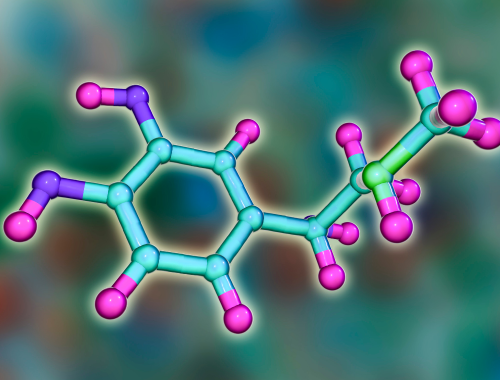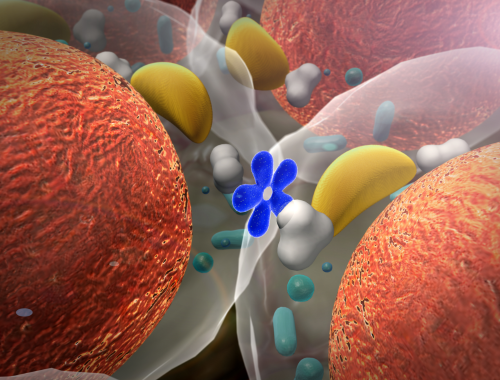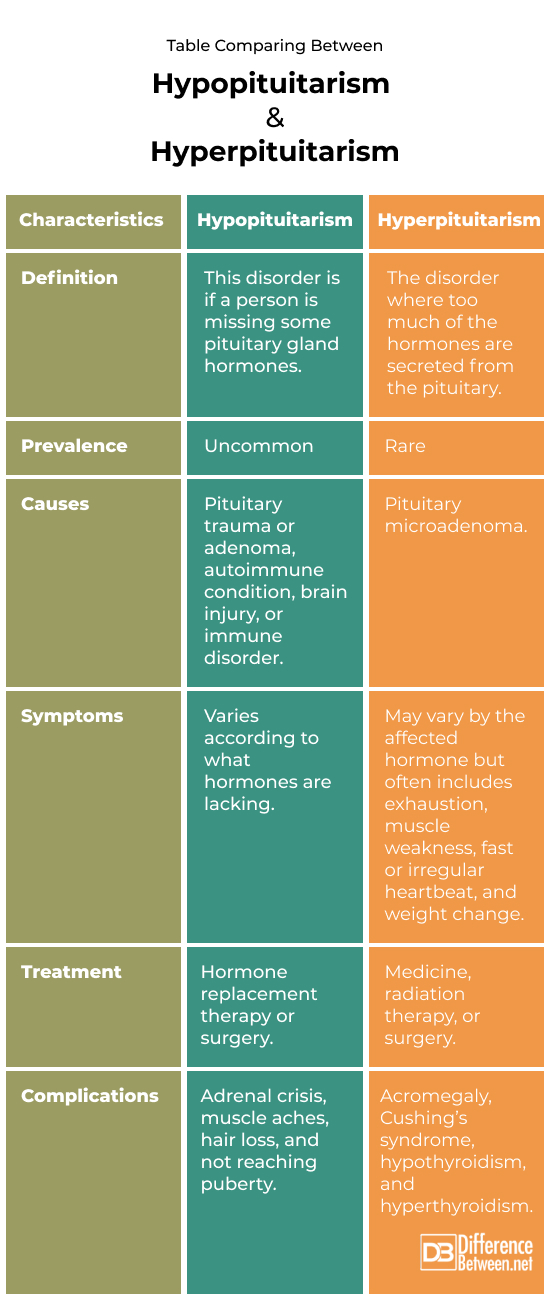Difference Between Hypopituitarism and Hyperpituitarism
Hypopituitarism is when there is a deficiency of hormones secreted by the pituitary gland. Hyperpituitarism is when there is too much of one or more of the hormones released from the pituitary gland.

What is Hypopituitarism?
Definition:
Hypopituitarism is when there are too few hormones being released from the pituitary. It can be that one hormone is lacking or it can be that more than one hormone is lacking.
Causes and prevalence:
There are many possible causes for a lack of pituitary hormones. Reasons for having hypopituitarism can include traumatic brain injury, amyloidosis, or sarcoidosis. There can be a problem with the hypothalamus due to brain injury. The hypothalamus sends signals to the pituitary gland to trigger the release of hormones. Other potential causes of the condition including having a tumor of the pituitary gland, and having an infection. The condition is quite uncommon in the population.
Symptoms and complications:
The signs of hypopituitarism are different according to the hormone that is missing. A lack of the gonadotropins results in people not reaching puberty. A lack of growth hormone can result in a person not growing much and remaining very short. There can be bad complications with hypopituitarism. For instance, a person may suffer infertility or enter the state of an adrenal crisis.
Diagnosis:
To diagnose the condition, hormone levels in the blood and urine should be tested. The results of measuring blood tests can help doctors diagnose exactly which hormone or hormones are at low levels or are absent. CT and MRI imaging scans can help doctors to see if the pituitary gland has a tumor.
Treatment:
If the condition is due to a tumor, then surgery can be done to remove the tumor. Irradiation can also help reduce the size of adenomas if it cannot all be removed during surgery. The irradiation is done on the larger tumors that are incompletely resected. Hormone replacement therapy is also a treatment choice for hypopituitarism; the missing hormones are given to the patient when they have hormone replacement therapy.

What is Hyperpituitarism?
Definition:
Hyperpituitarism is when too much of one or several hormones is produced and released by the pituitary gland.
Causes and prevalence:
A benign pituitary tumor, usually a microadenoma of the pituitary, can cause an overproduction of hormones from the pituitary gland. This is a very rare condition.
Symptoms and complications:
There are several symptoms that a patient may have that could indicate they have this pituitary gland problem. In general, the signs of hyperpituitarism include feeling nervous, rapid heartbeat, arrhythmia, exhaustion, weight loss, and muscular weakness. The condition can result in several complications. The person with hyperpituitarism may develop the following disorders as complications of their condition: Cushing’s syndrome, acromegaly, hypothyroidism, and hyperthyroidism.
Diagnosis:
Diagnosis of hyperpituitarism can be based on blood tests where the different pituitary hormones are measured and checked to see if they are within normal ranges. Imaging tests like CT and MRI scans can be done to check if there is a pituitary tumor.
Treatment:
Treatment varies but may include using medicine to control the secretion of hormones, for example, if too much prolactin is being produced the doctor will prescribe cabergoline. Surgery may be done if a tumor is found. The surgery is usually a transsphenoidal adenomectomy.
Difference between Hypopituitarism and Hyperpituitarism?
Definition
Hypopituitarism is if a person is missing some pituitary gland hormones. Hyperpituitarism is when too much of one or more hormones is being produced and released from the pituitary gland into the bloodstream.
Prevalence
Hypopituitarism is an uncommon condition. Hyperpituitarism is a rare condition.
Causes
The factors leading to hypopituitarism include sustaining a brain injury, having a pituitary adenoma or trauma, and having certain of the autoimmune disorders, like sarcoidosis. The cause of hyperpituitarism is usually the presence of a tumor on the pituitary; this tumor that causes hyperpituitarism is often called a microadenoma.
Symptoms
The symptoms vary with hypopituitarism based on the hormone that is lacking. The symptoms of hyperpituitarism include: exhaustion, muscle weakness, fast or irregular heartbeat, and weight loss
Treatment
Treatment for hypopituitarism includes surgical intervention or hormone replacement therapy. Treatment for hyperpituitarism include medicine or surgery.
Complications
Hypopituitarism can have complications like muscle aches, adrenal crisis, and hair loss. Hyperpituitarism can have complications like acromegaly, Cushing’s syndrome, hypothyroidism, and hyperthyroidism.
Table comparing between Hypopituitarism and Hyperpituitarism

Summary of Hypopituitarism Vs. Hyperpituitarism
- Hypopituitarism is when there is a lack of a hormone or hormones released from the pituitary.
- Hyperpituitarism is when too much of the pituitary gland hormones are released.
- Both hypopituitarism and hyperpituitarism can be treated surgically if a tumor is involved.
FAQ
What are the symptoms of hyperpituitarism?
Symptoms of too much pituitary gland hormones include fatigue, muscle weakness, fast or irregular heartbeat, and weight loss.
What happens in hyperpituitarism?
There is too much of a pituitary hormone (specifically growth hormone) being released, which causes problems.
What is another name for hyperpituitarism?
Hyperpituitarism is sometimes called pituitary gigantism.
What are the two types of hypopituitarism?
There is primary hypopituitarism and secondary hypopituitarism. Primary is when the pituitary gland is damaged, while secondary is when there is damage to the hypothalamus.
What is another name for hypopituitarism?
Hypopituitarism is also known as pituitary insufficiency.
- Difference Between Rumination and Regurgitation - June 13, 2024
- Difference Between Pyelectasis and Hydronephrosis - June 4, 2024
- Difference Between Cellulitis and Erysipelas - June 1, 2024
Search DifferenceBetween.net :
Leave a Response
References :
[0]Carmichael John D. “Hypopituitarism”. Merckmanuals. Merck & Co., 2023, https://www.msdmanuals.com/home/hormonal-and-metabolic-disorders/pituitary-gland-disorders/hypopituitarism
[1]Gounden, Verena, Hajira Basit, and Ishwarlal Jialal. "Hyperpituitarism." (2018). Statpearls
[2]Mayo Clinic. “Hypopituitarism”. Mayo Clinic, 2023, https://www.mayoclinic.org/diseases-conditions/hypopituitarism/symptoms-causes/syc-20351645
[3]Image credit: https://www.canva.com/photos/MADq3_XLXEs-f024-3097/
[4]Image credit: https://www.canva.com/photos/MADAYjvlFsg-organelle-hormone/
